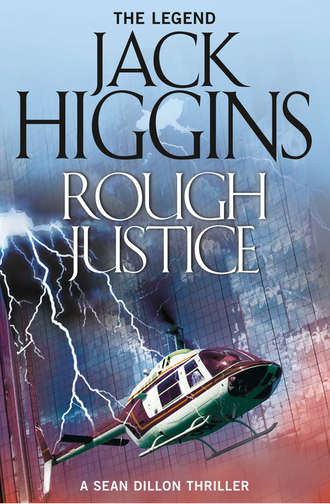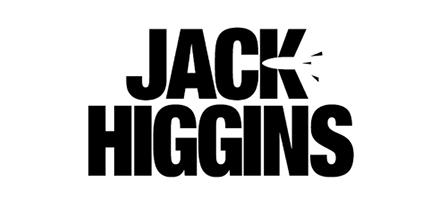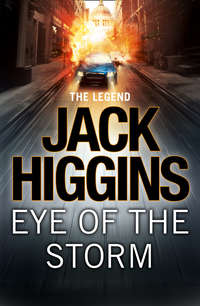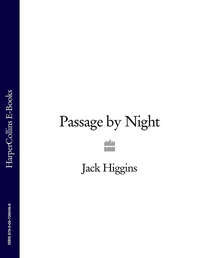
Полная версия
Rough Justice


Rough Justice

Published by HarperCollinsPublishers Ltd
1 London Bridge Street
London SE1 9GF
www.harpercollins.co.uk
First published in Great Britain by HarperCollinsPublishers 2008
Copyright © Jack Higgins 2008
Cover design © HarperCollinsPublishers Ltd 2008
Cover photograph © Paul Bowen/Getty Images (helicopter); Don Farrall/Getty Images (lightning)
Jack Higgins asserts the moral right to be identified as the author of this work.
A catalogue copy of this book is available from the British Library.
This novel is entirely a work of fiction. The names, characters and incidents portrayed in it are the work of the author’s imagination. Any resemblance to actual persons, living or dead, events or localities is entirely coincidental.
All rights reserved under International and Pan-American Copyright Conventions. By payment of the required fees, you have been granted the non-exclusive, non-transferable right to access and read the text of this e-book on screen. No part of this text may be reproduced, transmitted, down-loaded, decompiled, reverse engineered, or stored in or introduced into any information storage and retrieval system, in any form or by any means, whether electronic or mechanical, now known or hereinafter invented, without the express written permission of HarperCollins.
Source ISBN: 9780008124960
Ebook Edition © August 2015 ISBN: 9780007283422
Version: 2017-07-21
Contents
Cover
Title Page
Copyright
Dedication
Epigraph
NANTUCKET THE PRESIDENT
Chapter 1
THE VILLAGE OF BANU KOSOVO
Chapter 2
NANTUCKET LONDON
Chapter 3
THE KREMLIN LONDON
Chapter 4
BELFAST MARCH 1986
Chapter 5
LONDON WASHINGTON
Chapter 6
MOSCOW LONDON BEIRUT
Chapter 7
LONDON STOKELY
Chapter 8
Chapter 9
Chapter 10
Chapter 11
Chapter 12
SCOTLAND IRELAND
Chapter 13
DRUMORE PLACE
Chapter 14
LONDON END GAME
Chapter 15
About the Author
ALSO BY JACK HIGGINS
Further Reading
About the Publisher
For Ian Haydn Smith
We sleep safe in our beds because rough
men stand ready to visit violence on
those who would do us harm.
George Orwell
1
There was no place President Jake Cazalet wanted to be more right now than this Nantucket beach, the sea thundering in to the shore in the strange luminous light of early evening, the wind tasting of salt.
The President had been delivered there by helicopter from the White House only an hour before, and here he was, walking with his favourite Secret Service man, Clancy Smith; his beloved flatcoat retriever, Murchison, dashing in and out of the incoming waves.
‘He’ll need a good hosing,’ Cazalet said. ‘Silly old boy. You’d think he’d have learned by now that the salt is bad for his skin.’
‘I’ll see to it, Mr President.’
‘I’ll have a cigarette now.’
Clancy offered him a Marlboro and flicked his Zippo lighter, which flared in the wind. Cazalet smiled. ‘I know, Clancy, what would the voters think? It’s the curse of old soldiers.’
‘We’ve all been there, Mr President.’
‘Harper on communications as usual?’
‘Yes. The only other person in the house is Mrs Boulder, cooking dinner.’
‘Amen to that.’ Cazalet smiled. ‘I love this place, Clancy. Iraq, Afghanistan, our friends in Moscow – if we can call them that – they could all be on another planet when I’m here.’ He sighed. ‘At least until that damned helicopter picks us up and deposits me back at the White House.’
Clancy’s cellphone rang and he answered, listened for a few moments, then turned to Cazalet. ‘Blake Johnson, Mr President. He’s arrived back from Kosovo sooner than he thought.’
‘Well, that’s great. Is he coming down?’
‘By helicopter. And he also ran into General Charles Ferguson, who was passing through Washington on his way to London after some business at the United Nations. He thought you might like to meet with him, so he’s bringing him down, too.’
‘Excellent.’ Cazalet smiled. ‘It’s always good to see Ferguson, find out what the Prime Minister’s up to. It’d be interesting to get his take on Blake’s report, too.’
They continued walking. ‘I thought Kosovo was history, Mr President,’ Clancy said.
‘Not really. After what the Serbs did to them, they want their independence. The Muslims are in the majority now, Serbs the minority. It’s still a problem. The Kosovo Protection Corps the UN set up in 2004 is still operating – troops from various countries, a British general coordinating the situation – but when you get into the back country, things happen. There’ve been reports of outside influence, rumours of the presence of Russian troops.’
‘And they were always for the Serbs,’ Clancy pointed out.
‘Exactly, which is why I decided to send in Blake to scout around and see what’s happening.’ There was the sound of a helicopter in the distance. ‘That must be them. We’d better get back.’
Cazalet called to Murchison, turned to the beach house, and Clancy followed.
Blake and Ferguson sat together on one of the leather sofas beside the open fire, the coffee table between them and the President. Clancy served drinks, whisky and branch water for both of them. Cazalet toasted them.
‘Here’s to both of you. It’s a real bonus having you here, Charles.’
Ferguson said, ‘You look well, Mr President, and you, Clancy.’
‘We get by,’ Cazalet said. ‘How is the Prime Minister?’
‘I saw him three days ago and he seemed to be coping. Iraq hasn’t helped, and Afghanistan is a major problem. There’s combat of the most savage kind there – we haven’t seen its like since the hand-to-hand fighting against the Chinese on the Hook during the Korean War. Most of our infantry and paratroops are nineteen or twenty. Boys, when you think about it. They’re winning the battles, but perhaps losing the war.’
Cazalet nodded, remembering his time in Vietnam. ‘War has always been a young man’s game. So, tell me – what did the Prime Minister send his private security adviser to the UN for? Can you tell us, or is it for his eyes only?’
‘I can certainly tell you, Mr President. I’m keeping an eye on the Russian Federation. I sat in on two committees also attended by Moscow and Iran. Supposedly, they were trade delegations.’
‘Why am I laughing?’ Cazalet asked.
‘I listened, drifted around. Putin was the name on everyone’s lips.’
‘What would you say he’s after?’ Cazalet raised his hand. ‘No, let me put this in another way. What’s his purpose?’
‘I need hardly tell you, Mr President – to make the Russian Federation a power in the world again. And he’s using the riches of Russia’s gas and oil fields, networked throughout Europe as far as Scandinavia and Scotland, to do it.’
Blake said, ‘And once Europe signs up, if he wants to bring them to heel, all he has to do is turn off the taps.’
There was silence. Cazalet said, ‘He knows he couldn’t win anything militarily. One of our Nimitz aircraft carriers alone, plus its battle group, is the equivalent of the present Russian navy.’
‘And we certainly have enough of them,’ Blake put in.
Ferguson said, ‘He wouldn’t be so foolish as to imagine he could take those on and succeed.’
‘So what is he after?’ Cazalet asked.
‘A return to the Cold War,’ Ferguson said. ‘With certain differences. His personal experiences in Chechnya, Afghanistan and Iraq give him considerable insight into the Muslim mind. Extremist Muslims hate America in an almost paranoid way. Putin recognizes that and uses it.’
‘How do you mean?’ Cazalet asked.
‘The favourite weapon of the IRA was the bomb, and the influence of the IRA on revolutionary movements throughout the world has been enormous. Only a handful of years ago, they virtually brought London to a standstill, blew up the Baltic Exchange, almost wiped out the entire British Cabinet at Brighton.’
Cazalet nodded. ‘So what’s your point?’
‘Putin wants disorder, chaos, anarchy, a breakdown in the social order, particularly with countries dealing with America. In instructing his intelligence people to cultivate Muslims, he is actually getting them to do his dirty work for him. The terrorists’ favourite weapon is the bomb, too, which means increased civilian casualties, which means a growing hatred of all things Muslim. We hate them, they hate us – chaos.’
There was silence. Cazalet sighed and turned to Clancy. ‘I really could do with another drink. In fact, I think we all could.’
‘As you say, Mr President.’
Cazalet said, ‘After that, I could also do with some good news, Blake. Somehow I doubt I’m going to get it.’
‘Well, Kosovo could be worse, Mr President, but it also could be better. The United Nations troops are in place, but Bosnia intends to hang in there for as long as possible. The Serbian government in Belgrade has been urging the Serbs in Kosovo to boycott the November elections.’
‘And what’s the Muslim opinion on that in Kosovo?’
‘The memory of what the Serbs did in the war, the shocking butchery of the Muslims, will never go away. The Muslims want total independence, nothing less. And there are outside influences at work, which aren’t helping the situation.’
‘Such as?’ Cazalet demanded.
‘Well, when you go out into the boonies, you find villages, market towns that aren’t exactly twenty-first century, very old-fashioned people, Muslims on the whole. When I travelled to that part of the country, I found interlopers close to the borders. Russians.’
There was silence. Cazalet said, ‘What kind of Russians?’
‘Soldiers in uniform, not freebooters.’
‘Can you describe them? Which unit, that sort of thing?’
‘Actually, I can. The ones I met were Siberians. I know that because their commanding officer identified himself as a Captain Igor Zorin of a regiment called the Fifteenth Siberian Storm Guards. I checked them on my laptop, and the unit exists. It’s a reconnaissance outfit, special ops, that sort of thing. They were apparently based over the border in Bulgaria, and their mission was to visit a village called Banu that was supposed to be a centre for Muslim extremists crossing the border and creating merry hell in Bulgaria.’
Ferguson said, ‘This fellow Zorin, did you find him on the regimental roster?’
‘Oh, yes, he was there all right. But here’s the interesting thing – just as I was checking him out…he disappeared.’
‘What do you mean?’
‘My screen went blank. He might as well never have existed.’
There was a pause. Cazalet said, ‘Something you did, perhaps? You know what computers can be like.’
‘No, Mr President, I swear to you. What happened in Banu was shaping up to be pretty nasty and I witnessed it – and they clearly wanted no record of it.’
Ferguson nodded. ‘But except for your word in the matter, there’s no proof. Accuse the Russian government, they’ll simply deny it ever happened. I see the game they are playing.’
‘The cunning bastards,’ Cazalet said. ‘Somewhere in the Bulgarian mountains is a unit that doesn’t exist, commanded by a man who doesn’t exist named Igor Zorin.’
Blake said, ‘Actually, not quite, Mr President.’ He turned to Ferguson. ‘General, do you by any chance know a British Member of Parliament named Miller – Major Harry Miller?’
Ferguson frowned, ‘Why, was he involved in some way?’
‘You could say that. He shot Igor Zorin between the eyes. I’ve never seen anything like it.’
‘And he’s a Member of Parliament? What was he doing there in the first place?’ Cazalet demanded.
‘He was doing what I was doing, Mr President, checking out things in the back country. We met by chance at a country inn about twenty miles from Banu. We stayed overnight, got talking, and each of us discovered who we were. Decided to carry on together the following day.’
Cazalet turned to Ferguson. ‘Charles, this Major Harry Miller, do you know him?’
‘I know of him, but keep my distance, and by design. You know what I do for the Prime Minister – with my team, we provide a distinctly hands-on approach to any problems of security or terrorism. Most of what we do is illegal.’
‘Which means you dispose of bad guys without troubling the rule of law. I’ve no trouble with that, it’s the times we live in. Blake does the same for me, as you know. So what about Major Miller?’
‘I don’t fraternize with the Major, because I try to keep out of the political side of things, and he has a political relation ship with the Prime Minister. Before he became a Member of Parliament, though, he was a career soldier in the army, Intelligence Corps, retired some years ago.’
‘Quite a change,’ Cazalet said.
‘You could say that. He became an Under-Secretary of State in the Northern Ireland Office, a desk man helping to develop the peace process.’
‘A troubleshooter?’ Cazalet asked.
‘Exactly, but since the changes in Northern Ireland, the Prime Minister has found uses for him elsewhere.’
‘Again as a troubleshooter?’
‘The Prime Minister’s eyes and ears. Sent to Lebanon, Iraq, the Gulf States – places like that.’
‘And Kosovo,’ Cazalet said. ‘He must be quite a guy.’
‘He is, Mr President. People are very wary of him because of his privileged position. Even members of the Cabinet tread carefully. He is also modestly wealthy from family money, and married to a lovely, intelligent woman, an actress named Olivia Hunt, Boston born. In fact, her father is a Senator.’
‘Good lord,’ Cazalet said. ‘George Hunt. I know him well.’
There was silence now for a while and then Cazalet said, ‘Blake, old friend, I think it’s about time you told us exactly what happened in Banu that day.’
Blake reached for the shot glass in front of him, swallowed the whisky in it and leaned back. ‘It was like this. It was lousy weather, Mr President, and I’d just about had enough of it. I was driving myself in a jeep through a forest and over miserable terrain, and towards evening, I came to an inn near Kuman. The landlord appeared, and we were making arrangements for my stay when suddenly another jeep appeared out of the forest and the rain. It gave me quite a turn.’
‘Why was that?’
Blake considered. ‘It was strange, strange country, like some old movie taking place in Transylvania. There was rain, mist, darkness falling, and suddenly the jeep emerged from all that. It was kind of spooky.’
He accepted another whisky from Clancy, and Cazalet said, ‘Major Harry Miller?’
‘Yes, Mr President. I hadn’t expected anyone, not in a place like that, and there he was at the back end of nowhere.’
Cazalet nodded. ‘Tell us what happened, Blake, as you remember it, the whole business. Take your time.’
‘I’ll do my best, Mr President.’ Blake sat back thinking about it and suddenly, it was as if he was there.
2
Harry Miller was a little under six feet, with saturnine, grey eyes, and a slight scar tracing his left cheek, which Blake was old soldier enough to recognize as a shrapnel scar. He had a face that gave nothing away, that showed only a man, calm and confident in himself. Also, someone who’d known command, unless Blake was much mistaken. He wore an old-fashioned long military trench coat over basic camouflaged field overalls, the kind any ordinary soldier might wear, and paratroop boots. A crumpled combat hat guarded him against the rain, as he ran across to the steps to the inn, a canvas holdall in his left hand.
He stood in the porch, beat his hat against his leg. ‘Bloody rain, godawful country.’ And then he held out his hand to Blake and smiled, for the moment totally charming. ‘Harry Miller. Who might you be?’
Blake had never liked anyone so much so quickly. ‘Blake Johnson.’
Something showed in Miller’s face, a change of expression, ‘Good heavens, I know who you are. You run the Basement for Cazalet.’
His announcement was received by Blake with astonishment. ‘How in the hell do you know that?’
‘Work for the Prime Minister. Poke my nose in odd places when he orders and report back. That’s what I’m doing now. What about you?’
‘Doing exactly the same thing for the President. I had to see someone in Zagreb, and I thought I’d check out Kosovo before I went back.’
‘Excellent. Let’s freshen up and compare notes over dinner.’
When Blake came down from his room a little while later, he found the innkeeper, one Tomas, behind the bar. The room was pleasant, a beamed ceiling, a log fire burning.
‘I’ll have a beer. It’s very quiet.’
‘You and the Major are the only guests.’
‘Major?’ Blake said.
‘So it says in his passport, sir.’ He poured the beer. ‘We don’t get many guests these days.’
‘Why not?’
‘Bad things can happen, just like in the war. People are afraid.’
At that moment Miller came down the stairs into the great lounge and found him.
‘Beer?’ Blake asked.
‘Perfect. What’s happening?’
‘I was just asking him why there’s no one here. He says people are afraid.’
‘Of what?’ Miller asked.
Tomas pushed two large flagons of beer across the bar. ‘Between here and the Bulgarian border is not a good place. I would leave, but the inn is all I have.’
Miller said, ‘So what gives you the problem?’
‘Those who cross the border and attack the villages.’
‘And who are they?’
‘People who don’t like Muslims. But sit by the fire, gentlemen, and enjoy your drink. We have good bread, sausages and a lamb stew. I’ll bring your beer over.’
They did as he suggested, taking a chair each on either side of a great log fire. There was a small table next to each chair and he put the beer down carefully. ‘The food will be ready soon.’
He turned away and paused as Miller said, ‘But the soldiers of the Kosovo Protection Corps – what about them?’
The innkeeper nodded. ‘They are good people, but their effect is minimal. Small patrols, jeeps, sometimes a Warrior or two. They appear and then go away again, which leaves us at the mercy of those who would harm us.’
‘Again, who are they?’ Blake asked.
‘Sometimes Russians.’
Miller said to the innkeeper, ‘Are you saying uniformed soldiers from the Russian Army?’
‘Oh, yes, sir. Usually they stay close to the border.’ He shrugged. ‘They have even been as far as this inn. Maybe a dozen men, all in uniform.’
Miller said, ‘So how did they treat you?’
‘The food in my inn is excellent and I sell good beer. They ate, they drank, and they went. Their captain even paid me, and in American dollars.’
Blake said, ‘So they did you no harm?’
The innkeeper shrugged. ‘Why should they? The captain said they’d see me again. To burn me down would be to penalize themselves. On the other hand, there were bad things happening elsewhere. Several people died in a village called Pazar. There was a small mosque. They burned that and killed seven people.’
Miller said, ‘Just a minute. I was at the Protection Corps headquarters the day before yesterday. I asked to see their file on incident reports for the past six months, and there was one on this place Pazar. It said that, yes, the small village mosque had been burned down, but when the Protection Corps sent a patrol to check it out, the village mayor and his elders said it was an accidental fire, and there was no mention of seven dead people, certainly no mention of Russian soldiers.’
‘The village council decided it was not in their best interests to make an official complaint. The Russian authorities would always deny it, and some bad night, the villagers would find themselves going through it all over again.’ The innkeeper bowed slightly. ‘And now please excuse me. I must see to your dinner.’
He disappeared through a green baize door leading to the kitchen. Blake said, ‘What do you think?’
‘I suspect what he said about the villagers at Pazar taking the easy way out is true.’
‘You were in the military?’ Blake asked.
‘Yes, Intelligence Corps.’
‘So when you became a Member of Parliament, the Prime Minister decided that your special talents could be put to good use?’
‘Whenever he sees what appears to be a problem, he sends me. I’m classed as an Under-Secretary of State, although not attached to any particular Ministry. It gives me a little muscle when I need it.’ He drank some of his beer. ‘And what about you?’
‘To a certain degree, I’m in a similar situation. The President’s man.’
Miller smiled gently. ‘I’ve heard about what you do. Only whispers, of course.’
‘Which is the way we like it.’ Blake stood up. ‘I think they’re ready for us now. Let’s eat.’
‘Excellent,’ Miller said, and followed him out.
Afterwards, the meal having proved excellent, they returned to their seats by the fire and the innkeeper brought coffee.
Blake said, ‘I’ve been thinking. I’m only here for another couple of days, travelling south, visiting a few villages, getting the feel of things.’
‘From here to the border?’ Miller said. ‘That makes sense. I checked it all out on the maps. A lot of forest, villages from a bygone age. The people go nowhere, only to market, they keep to themselves.’
‘Peasants who keep their heads down and don’t want trouble.’ Blake nodded. ‘Have you anywhere in mind?’
‘There’s a place called Banu, deep in the forest, about ten miles from the border.’
‘How far from here?’
‘Thirty miles or so, dirt roads, but it could be worthwhile. We could leave your jeep here and travel in mine, that’s if you favour the idea of us going together?’
‘Favour it?’ Blake said. ‘I’d welcome it. What time do you suggest in the morning?’
‘No need to rush. Let’s enjoy a decent breakfast and get away about nine to nine thirty.’
‘Excellent,’ Blake told him. ‘I think I’ll get an early night.’
Miller glanced at his watch. ‘It’s later than you think. Half past ten. I’ll hang on, enjoy a nightcap and arrange things with the innkeeper.’
Blake left him there, and mounted the wide stairway. There was something about Miller, a calmness that seemed to distance him from other people, a self-assurance that was obvious, and yet no arrogance there at all.









